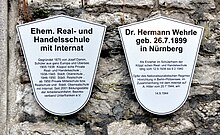Hermann Josef Wehrle
Hermann Josef Wehrle (born July 26, 1899 in Nuremberg , † September 14, 1944 in Berlin-Plötzensee ) was a German Roman Catholic priest and resistance fighter against National Socialism .
Life
Wehrle is the great-grandson of the social pedagogue and journeyman's association founder Johann Gregor Breuer . In his early childhood, his family moved to what is now Frankfurt's Höchst district , which at that time was still an independent town and district seat. Hermann Josef Wehrle grew up there and went to school. In 1917 he passed the secondary school diploma at the local humanistic high school , today's Leibniz School . In the First World War he participated in the war from 1917, after which he studied Catholic theology in Fulda , but broke off his studies in 1922.
He studied in Frankfurt philosophy and history and received his doctorate there in 1928. From 12 September 1938 until 9 February 1940, he was an educator in the dormitory of Köppl'schen real and business school in Marktbreit operates. From 1940 he continued his theology studies, in 1942 he was ordained a priest and took up a position as a chaplain in the Heilig Blut parish in Munich 's Bogenhausen district .
On December 13, 1943, Wehrle was asked under the seal of secrecy by Ludwig Freiherr von Leonrod whether the knowledge of the preparation of an assassination plan was already a sin. Wehrle denied this after consulting the Lexicon for Theology and Church for the question of tyrannicide .
On August 18, 1944 Wehrle was as accomplices of the assassination on 20 July 1944 in Munich / Bogenhausen by the Gestapo arrested and taken in the night train to Berlin to participate in the hearing against Leonrod before the People's Court , meanwhile, President Roland Freisler who for 19 August 1944 was ordered to be first heard as a witness. In the trial against himself, which took place on September 14, 1944, he was sentenced to death by Freisler and hanged on the same day in Plötzensee . Leonrod's petition for pardon, possibly made under torture, was his undoing, which was read out by Freisler at the trial against Wehrle:
"When passing judgment or the way the judgment was carried out, I would ask you to take into account that I did not stand before the People's Court today, or that I would not have participated in the preparations for July 20, but that I would have filed a complaint after Stauffenberg had introduced the plan if I had been advised differently by my confessor. "
Appreciation
The Catholic Church accepted Chaplain Hermann Joseph Wehrle as a witness of faith in the German martyrology of the 20th century .
After the war, streets in several German cities were named after Hermann Joseph Wehrle. B. the Wehrleweg in Hanover-Wettbergen or the Wehrlestrasse in Munich-Bogenhausen.
In the Heilig Blut church in Munich-Bogenhausen, a plaque commemorates Kaplan Wehrle.
In Frankfurt am Main, a bronze plaque with his portrait and dates of his life was placed on the site of his temporary (bombed) house.
literature
- Benedicta Maria Kempner : Priest before Hitler's tribunals. Verlag Rütten and Loening, 1966.
- Helmut Moll (publisher on behalf of the German Bishops' Conference), witnesses for Christ. The German Martyrology of the 20th Century , 7th revised and updated edition Paderborn u. a. 2019, ISBN 978-3-506-78012-6 , Volume I, pp. 472-473.
- Franz J. Morschhäuser: Hermann Joseph Wehrle (1899-1944). Faith in times of trouble. EOS-Verlag, St. Ottilien 2000, ISBN 3-8306-7026-5 .
- Arnim Ramm: July 20th before the People's Court. Wissenschaftlicher Verlag Berlin, Berlin 2007, ISBN 978-3-86573-264-4 .
- Maria Vogel: Dr. Hermann Josef Wehrle. A Frankfurt resistance fighter. Edition Fischer, Frankfurt am Main 1993, ISBN 3-89406-737-3 .
- Ekkart Sauser : Wehrle, Hermann Joseph. In: Biographisch-Bibliographisches Kirchenlexikon (BBKL). Volume 13, Bautz, Herzberg 1998, ISBN 3-88309-072-7 , Sp. 591-592.
Web links
- Literature by and about Hermann Josef Wehrle in the catalog of the German National Library
- A Munich priest before Hitler's People's Court
- Hermann Josef Wehrle: "Our heart is restless" - From an unusual person and a gifted priest (PDF; 80 kB)
Individual evidence
- ↑ kathisch.de : Alfred Delp was executed 60 years ago ( memento of July 31, 2007 in the Internet Archive ), accessed on February 14, 2009
- ↑ Documented in the film "Geheime Reichssache" by Jochen Bauer.
- ↑ Photo , accessed September 9, 2019.
| personal data | |
|---|---|
| SURNAME | Wehrle, Hermann Josef |
| ALTERNATIVE NAMES | Wehrle, Hermann Joseph |
| BRIEF DESCRIPTION | German Catholic priest and resistance fighter |
| DATE OF BIRTH | July 26, 1899 |
| PLACE OF BIRTH | Nuremberg |
| DATE OF DEATH | September 14, 1944 |
| Place of death | Berlin-Plötzensee |
